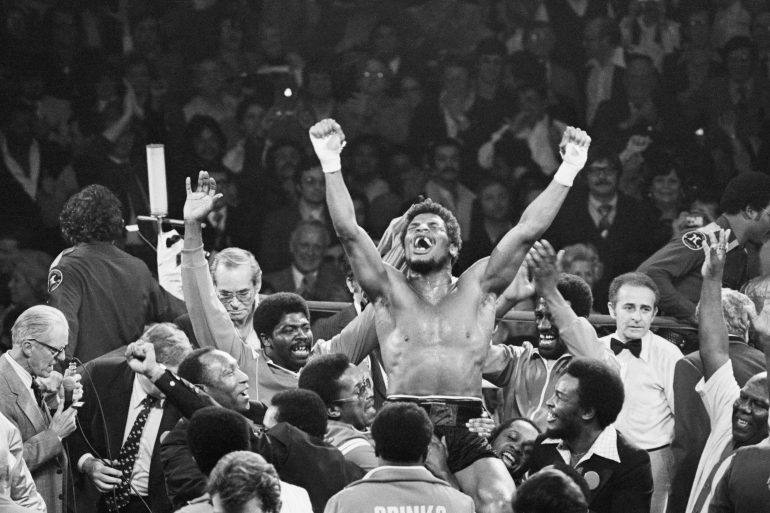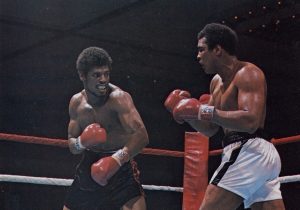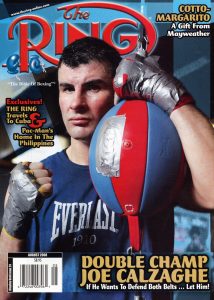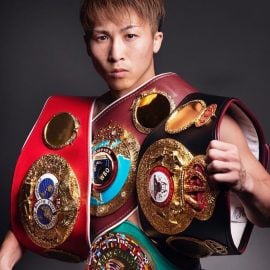Dougie’s Monday Mailbag (remembering Leon Spinks, Calzaghe and B-Hop)

REMEMBERING NEON LEON
Hi Doug,
I was sad to hear this weekend of the passing of Leon Spinks. He came along during such an incredible era in boxing. Everyone was glued to their TVs each night back in ‘76 during the Olympics as the U.S. never fielded a team as talented and exciting as that before or since. So many of our guys took home gold medals. I remember Leon, who’s style was free swinging and aggressive getting the worst of it during the last round of the gold medal match with the Cuban fighter and then racing across the ring and dropping his opponent in a heap with one big right hand shot to win by TKO. We all cheered out loud. In 1978 when he fought Ali of course I was for the champ, who played a waiting game and rope a doped but Leon did not get tired. He fought like a tiger, out hustled Ali and deserved to get the nod.
Leon found it hard to hold on to the title or to even get back to the level that he had been but he always showed up and each time I saw him win or lose he tried to win. He became fodder for a lot of comedians (Richard Pryor comes to mind) and Leon might have laughed at some of it, who knows. I felt bad for Leon because the deck just seemed to be stacked against him. A lot of people took advantage of him. I saw Leon fight in person toward the end of his career when he took on Tex Cobb at Nashville’s municipal auditorium on March 3, 1988 on a card that included Frankie Randall, Chris Calvin and Jerome Coffee. It was a free-swinging slugfest and at the end Tex Cobb was so exhausted that he could not even clinch, he just leaned on Leon, too tired to even raise his arms. I thought Leon won but the decision went to Cobb who was literally carried from the ring to spent to stand. Such were the fortunes of Leon who couldn’t seem to get a break.
When I heard the news about Leon and read the reports I was surprised to see that he and I are the same age. It makes one realize how fragile life is. I would also like to remember Leon Spinks for his service in the United States Marines. A couple of my best buddies are Marines and I know what it takes to become one. It’s not something that anyone can just step up and do. I do know that the Corps was proud of him too. Thank you for your service Leon…and for some unforgettable moments in the ring. – David, Nashville
Thank you for these moving and eloquent words on Spinks’ passing, David. You echo a lot of thoughts that Michael Marley (who gave Spinks the “Neon” nickname back in his newspaper-writing days) shared in this column.
Give it a read if haven’t already done so.

May 1978 issue
I was sad to hear this weekend of the passing of Leon Spinks. He came along during such an incredible era in boxing. Spinks is part of my earliest memories of boxing. I was aware of the gold medal winner from the 1976 Summer Games, but he exploded (unexpectedly) into my consciousness with his upset defeat of my hero, Muhammad Ali. I was dejected by that outcome, but it taught me something about the sport – fighters get old. My dad told me that Ali was “getting old” before the Earnie Shavers fight (noting previous bouts – vs. Jimmy Young and Ken Norton – that he should have lost) but that didn’t make any sense to me. Ali was the champ, the brightest celebrity personality on earth, a superhero. But just the highlights of the Spinks fight made me see reality. As sad as that reality was, I couldn’t be mad at Spinks. His happy-go-lucky personality, as well as his humility and affection for Ali, wouldn’t allow for any resentment. And once Ali beat him in the rematch, I was totally fine with Neon Leon (by contrast, I was bitter toward Larry Holmes from the time he battered Ali until his second comeback following his loss to Mike Tyson). But I didn’t know what to make of Spinks as a boxer. The only other fighters I was aware of around this time was Sugar Ray Leonard and rivals (Wilfred Benitez, Roberto Duran, Thomas Hearns), and as young and inexperienced as I was as a fan, I knew that Spinks wasn’t in their class.
However, looking back on the fight he gave Ali in their first fight and some of his performances prior to his failed title challenges against a prime Holmes and Dwight Muhammad Qawi (at cruiserweight) – namely his gutsy efforts against Alfredo Evangelista (KO 5), Eddie Lopez (SD 10), Bernardo Mercado (TKO 9) and Jesse Burnett (12 UD) – lets me know that he was a legit (lower top-10) heavyweight contender in 1978 and 1980 and a solid cruiserweight standout during the early years of that division (1981-’85).

Photo from The Ring archive
I understand why Spinks went for the Ali fight so early in his career. It was a once-in-a-lifetime opportunity to face a living legend and actually a chance at winning. His team rolled the dice and they won, but it was too much too soon. That was his eight pro bout, the night of his great victory was exactly 13 months after his pro debut. So, I’ve wondered how Leon’s career would have went had he been allowed to develop a little bit like his brother Michael, who didn’t fight for his first world title until his 17th pro bout (and wasn’t in a scheduled 10-rounder until his 10th bout and THEN he advanced to facing contenders), or his U.S. Olympic teammate John Tate, who won the WBA heavyweight title that Ali vacated after beating Spinks (vs. Gerrie Coetzee) in his 20th pro bout. He may have missed his opportunity to face Ali had he had a few years to properly develop, but he could have had a more consistent career.
Having said that, Leon liked to party. He may have been a hot-and-cold fighter regardless of how he was brought up and let’s face it he likely would not have won the heavyweight championship of the world if he didn’t get a crack a very faded Ali. Leon’s prime years would coincided with Holmes’ prime years, and he was never going to beat Larry. And I don’t think he could have beaten “Big John” either. Tate was not only a modern-sized heavyweight (6-foot-4, 80-inch reach and 230-240 when in shape) but a talented boxer.
THE TRAGEDY OF LEON SPINKS
I write this after hearing about Leon Spinks’s passing. It seems his life and career can be summed up in one word: tragic. He fought years before my time… but it seems like, with hindsight being 20/20, everything went down the drain after the rematch with Muhammad Ali. After winning a gold medal and being part of one of the greatest Olympic boxing teams of all time, it’s like everything was downhill for Neon Leon after that.
Leon’s death also partially highlighted the contrast between brothers upon taking a closer look. On one hand, Neon Leon retired 26-17 and was deeply battle scarred. Meanwhile, Michael the Jinx retired 31-1 (his lone hiccup being the 91 second KO at the hands of Iron Mike) and is one of the few men who hung up their gloves and walked away health and wealth intact. An impressive feat, wouldn’t you say?
What do you make Leon Spinks’s career, Dougie? Could he have been more? Perhaps I’m focusing too much on the negative side. Of all the biggest heavyweight upsets, where do you put his win over Ali? Is it above or below Lewis-Rahman I or Joshua-Ruiz I? Those are the biggest of the past thirty years, yes? Sure, Ali was a shadow of his former glory… but Spinks was still a HUGE underdog right? (Maybe a list of top 10 heavyweight upsets will do)
In the hopes of ending this on a more positive note… some mythical matchups between Neon Leon and other heavyweights to pull off big upsets:
Neon Leon vs Andy Ruiz Jr.
Neon Leon vs Oliver McCall
Neon Leon vs Corrie Sanders
Neon Leon vs Lamont Brewster
Neon Leon vs Hasim Rahman
Neon Leon vs James J. Braddock
Neon Leon vs Michael the Jinx (brother vs brother… because why not?) – Gregory K.
I think the best version of Leon could outwork Braddock, but I don’t see him beating any of the other “Cinderella Men” you’ve matched him with on their best nights. His best could outwork them when they didn’t train right, on off night, but he just wasn’t big enough to beat those other guys on their best nights. Leon would be a cruiserweight by today’s standards. His best weight was between 195-200 pounds. His brother wouldn’t have a size advantage against him, but Michael was much better/smarter boxer; the savvy of the Jinx outlasts and outpoints the savagery of Neon.
I write this after hearing about Leon Spinks’s passing. It seems his life and career can be summed up in one word: tragic. I don’t know about all that. He did himself right with his military service and stellar amateur career. He made his family, city, state, and country proud with his Olympic gold-medal victory. He briefly stood on top of the world (from February to September 1978).
And Spinks enjoyed himself along the way. I’ve read a lot articles and books that chronicle his “joy ride” from the Olympic Games to the two Ali bouts, and the man had A LOT of good times. I think he continued to enjoy himself (to a self-destructive extreme) during the ups and downs of the early to mid-1980s. The hard times came on when his body gave out and the money dried up (by the late ’80s). The tragedy really starts when his health issues began to surface (although you could say it truly began with a childhood of poverty and the spiritual disease of addiction).
He fought years before my time… but it seems like, with hindsight being 20/20, everything went down the drain after the rematch with Muhammad Ali. That’s one way to look at it, but the truth is that without Ali he was unlikely that he would have ever tasted glory. Like I stated in my previous reply, he was never going to beat Larry Holmes. And although many of the heavyweight standouts of the early-to-mid-‘80s were just as undisciplined and erratic as he was, I don’t think he could have defeated the titleholders of that time period (Tate, Mike Weaver, Michael Dokes, Coetzee, Tim Witherspoon, Pinklon Thomas, Tony Tubbs and Greg Page). Most of those dudes did their share of nose candy and partying, but they were natural heavyweights and very talented. The tragedy is that Leon was stuck between weigh classes during his era. He couldn’t boil down to 175 pounds after turning pro and the cruiserweight division didn’t come into existence until 1980. And I hate to say it, but the first 190-pound titleholders, such as Marvin Camel, Ossie Ocasio and even ST Gordon probably would have beat him. Carlos DeLeon and Qawi both stopped him in six rounds.
After winning a gold medal and being part of one of the greatest Olympic boxing teams of all time, it’s like everything was downhill for Neon Leon after that. He had some decent wins – some of which were nationally televised – following the rematch loss to Ali (although he was blitzed in one round by Coetzee in his lone bout of 1979). Check out this CBS broadcast of his fifth-round stoppage of former heavyweight title challenger Alfredo Evangelista:
Leon’s death also partially highlighted the contrast between brothers upon taking a closer look. On one hand, Neon Leon retired 26-17 and was deeply battle scarred. Meanwhile, Michael the Jinx retired 31-1 (his lone hiccup being the 91 second KO at the hands of Iron Mike) and is one of the few men who hung up their gloves and walked away health and wealth intact. They’re brothers but they were very different human beings. Michael was every bit the introvert that Leon was the extrovert. I’m sure Michael was shy around girls in school and not the life of the party, as I know Leon was, but that kind of restraint and reticence is usually a good thing for prize fighters. However, as I noted in the previous reply, Michael was allowed to mature and develop in steps, moving from six- and eight-rounders before graduating to 10-round bouts and world-class opposition. Who knows if Michael would have been unbeaten as a light heavyweight had he gone for a world title in his eighth pro bout?
What do you make Leon Spinks’s career, Dougie? He was a comet, a shooting star. Some athletic talent is just meant to burn bright for very short period of time, then they burnout.
Could he have been more? He could have had a more successful career in terms of his win-loss ratio and in terms of management (he definitely needed to retire by the mid-‘80s and do a better job of saving his money).
Perhaps I’m focusing too much on the negative side. You are a little bit, but I think that’s just how modern boxing fans have been conditioned to think in recent decades. They want all the standouts to have perfect or near-perfect storybook careers and lives, maybe because they assume that sparkling records and money in the back equals happiness.
Of all the biggest heavyweight upsets, where do you put his win over Ali? Is it above or below Lewis-Rahman I or Joshua-Ruiz I? I think I’d rate Leon’s triumph just under those two in terms of upsets.
Those are the biggest of the past thirty years, yes? Yeah, but I’d include Lamon Brewster and Fury over Klitschko.
Sure, Ali was a shadow of his former glory… but Spinks was still a HUGE underdog right? Spinks was indeed an underdog, but Ali wasn’t viewed as unbeatable by this time. The aging champ had looked vulnerable for years and was lucky to get wins over Jimmy Young and Ken Norton in 1976. So, it wasn’t inconceivable that Ali could lose to even a novice like Spinks. In fact, one could argue that Michael’s razor thin UD over Holmes in 1985 was the bigger upset (although Larry had looked shaky in some previous bouts). The really BIG heavyweight upsets are when the underdog beats a seemingly invincible foe, such as when James Braddock outpointed Max Baer or when Buster Douglas halted Mike Tyson in Tokyo or when Max Schmeling dissected young Joe Louis or when Cassius Clay bewildered Sonny Liston and then later, as the great Ali, took down George Foreman in Kinsasha. And when the “old guy” wins, as Jersey Joe Walcott did by landing a one-hitter-quitter on nemesis Ezzard Charles in 1949 or when 45-year-old Foreman did the same to Michael Moorer, that’s also a big deal upset.
UNDISPUTED CHAMPIONSHIPS THAT DIDN’T HAPPEN
Greetings, Doug,
First of all, thanks a lot for your reply to my last Monday’s mail regarding the state of SMW, as well as about 168lbs MM’s.
Slow weekend for boxing, so I thought I’d come up with some MM’s again. I was particularly thinking about fights, that, had they happened, would’ve been for the undisputed championship. Unfortunately, they didn’t happen for this or that reason.
Wlad vs. Wilder in 2015
Haye vs. Cunningham in 2008
Ward vs. Adonis in 2017
GGG vs. BJS in 2017
Mayweather vs. Brook in 2015 (instead of Mayweather vs. Berto)
Forrest vs. Spinks in 2003 (had Vernon gotten a decision in the Mayorga rematch)
Thanks, in advance. And have a good day. – Edward
Interesting Mythical Matchups, Edward.
Wlad vs. Wilder in 2015 – Klitschko by mid-rounds TKO
Haye vs. Cunningham in 2008 – Haye by close UD
Ward vs. Adonis in 2017 – Ward by UD
GGG vs. BJS in 2017 – Golovkin by UD
Mayweather vs. Brook in 2015 (instead of Mayweather vs. Berto) – Mayweather by UD
Forrest vs. Spinks in 2003 (had Vernon gotten a decision in the Mayorga rematch) – Spinks by close UD or MD (unless Gale Van Hoy and Michael Pernick – the two judges who scored what should have been Next Generation’s middleweight championship victory for Jermain Taylor in 2007 – are working that fight)
CALZAGHE’S UNDEFEATED RECORD
Hi Dougie,
Following your discussion on unbeaten records in Friday’s mailbag, I’m wondering what your thoughts are on Wales’ finest, Joe Calzaghe.
He retired in 2008 with a 46-0 record after 10+ years at the top and over 20 world title fights. I noted your comments about undefeated fighters padding out their records, and there are undoubtedly names on his record (WBO title defences against Rick Thornberry, Tucker Pudwill, Will McIntyre) who can hardly be seen as world class.
However, during his career he held all 4 alphabet belts, The Ring Super-Middleweight and Light-Heavyweight titles and, whilst there might not be many Hall of Famers on his record, he beat 10 fighters who at some point held a world title during their career. He fought and beat everyone in the division, never ducking anyone, and can’t be blamed for the lack of real quality opponents on his record.
The only boxer he didn’t fight was Sven Ottke, another undefeated fighter, but someone who didn’t face the same calibre of opponents as Calzaghe, and who, in my opinion, benefitted from some dubious hometown decisions.
Some mythical match-ups, all at super middleweight:
Calzaghe v Ottke
Calzaghe v Steve Collins (who Joe was meant to challenge for his WBO title in 1997 before SC retired)
Calzaghe v Nigel Benn (version that beat Gerald McClennan)
Calzaghe v RJJ (mid 90s version, not the faded version that Joe easily outpointed.)
Regards. – Phil, Beverley, UK
Your Mythical Matchups:
Calzaghe v Ottke – Calzaghe by UD (unless they fight in Germany)
Calzaghe v Steve Collins (who Joe was meant to challenge for his WBO title in 1997 before SC retired) – Calzaghe by close UD
Calzaghe v Nigel Benn (version that beat Gerald McClennan) – Calzaghe by close UD
Calzaghe v RJJ (mid 90s version, not the faded version that Joe easily outpointed) – Jones by competitive UD or late stoppage.
 I’m wondering what your thoughts are on Wales’ finest, Joe Calzaghe. Anyone who pays attention to my Mythical Matchup picks involving the Welshman knows I hold Calzaghe in very high regard.
I’m wondering what your thoughts are on Wales’ finest, Joe Calzaghe. Anyone who pays attention to my Mythical Matchup picks involving the Welshman knows I hold Calzaghe in very high regard.
He retired in 2008 with a 46-0 record after 10+ years at the top and over 20 world title fights. In terms of accomplishments, longevity and consistency, he’s arguably the best super middleweight ever.
The only boxer he didn’t fight was Sven Ottke, another undefeated fighter, but someone who didn’t face the same calibre of opponents as Calzaghe, and who, in my opinion, benefitted from some dubious hometown decisions. There’s a reason Calzaghe is in the International Boxing Hall of Fame and Ottke isn’t.
LAST OF THE GREATS
Hey Dougie,
Maybe you have done this already but I’m hoping you can expand upon your statement that Bernard Hopkins is the last of the great fighters. Can you please explain in some detail what you mean?
Obviously, I agree Hopkins is an all-time great but Manny & Chocolatito (maybe a couple others like Floyd) should be considered as “last of the great fighters” as well? Thanks, Dougie. – Dan Grabowski
Pacquiao – in my opinion – crossed into all-time greatness with the Keith Thurman victory (I realize that others viewed him as an ATG many years ago, but the bar for that rare status is a lot higher in my book than it is in others). However, I don’t see the Fighting Senator as much as I do Hopkins. The next time I see him, I’ll say “Hey Manny, you’re the last of the great fighters.” My man Chocolatito is now and forever will be the KING, but he’s not up on Mt. Olympus with the ATGs yet. He might yet ascend to the realm of the boxing immortals depending on what happens on March 13th and a potential third bout vs. his nemesis Srisaket Sor Rungvisai.

September 2011 cover
Maybe you have done this already but I’m hoping you can expand upon your statement that Bernard Hopkins is the last of the great fighters. Can you please explain in some detail what you mean? It’s real simple: B-Hop equaled and exceeded the accomplishments and benchmarks of the all-time greats. He’s got the record for the longest uninterrupted middleweight title reign (10 years+). Nobody has held a major world title longer than Hopkins in a division that has a championship lineage dating back to 1884. He’s also got the title defense record (20), which exceeded the previous record set by Carlos Monzon. Prior to Hopkins (and later GGG), only Marvin Hagler came close to Monzon’s record of 14 defenses (the Marvelous One had 12). Monzon and Hagler are great middleweights. But their legacies are begin and end at middleweight. Hopkins made history at light heavyweight, breaking George Foreman’s record of being the oldest fighter to win a major world title. He broke it at age 46 with the Jean Pascal rematch and then broke it again at 48 with the Tarvoris Cloud win. Going up against champs, titleholders and legit contenders like Pascal, Cloud, Chad Dawson, Beibut Shumenov and Karo Murat during his mid-to-late 40s was reminiscent of Archie Moore. Foreman and Moore are great fighters. Hopkins reached their heights by continually challenging himself and facing elite boxers that are already enshrined in the hall of fame (with him): Trinidad, De La Hoya, Wright and Calzaghe got in before he did. We all know Roy Jones Jr. is getting in. And B-Hop faced a number of borderline HOFers: Tarver, Pavlik, Kovalev, Pascal. Hopkins challenged himself more in his 40s than most of today’s elite fighters are willing to do in their 20s and 30s. That’s why he’s the last great fighter.
Email Fischer at [email protected]. Follow him on Twitter and IG at @dougiefischer, and join him, Tom Loeffler, Coach Schwartz and friends via Tom’s or Dougie’s Periscope every Sunday.














